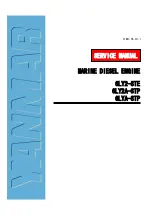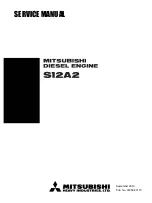
CHARGING SYSTEM - 4C - 7
90-816462 2-695
5. Turn off accessories and reinstall coil wire. Start
engine and adjust engine speed to 1500-2000
RPM. Quickly observe ammeter. Reading should
be at least 30 amps.
6. If reading is low, stop engine and connect a jump-
er wire between alternator output terminal and
regulator terminal. Repeat Steps 4 and 5.
7. If reading is now within specifications, diodes are
faulty. Disassemble alternator and replace rectifi-
er as explained under “Alternator Repair,” follow-
ing, to determine if fault is in regulator or alterna-
tor.
8. If reading is still low with jumper wire connected,
perform “Voltage Output Test,” following, to deter-
mine if fault is in regulator or alternator.
72787
b
c
d
a
e
a - Output Wire - ORANGE
b - Ammeter (0-50 Amps)
c - Jumper Lead
d - Regulator Terminal
e - Ground
Voltage Output Test
Perform this test to determine if voltage regulator is
operating correctly, using a 0-20 volt DC voltmeter.
IMPORTANT: Battery MUST BE fully charged
(1.260 or above specific gravity) to obtain proper
voltage reading in this test. If necessary, charge
battery with a battery charger or allow engine to
run a sufficient length of time to fully charge bat-
tery before taking reading.
1. Connect positive (+) voltmeter lead to positive
(RED) battery terminal and negative (–) voltmeter
lead to negative (BLACK) terminal.
2. Start engine and run at fast idle until engine
reaches normal operating temperature. Adjust
engine speed to 1500-2000 RPM and observe
voltmeter for highest reading. Reading should be
between 13.9 and 14.7 volts.
3. If reading is high, check for a loose or dirty regula-
tor ground lead connection. If connection is good
(and sensing circuit checked out good in “Circuit-
ry Test”), voltage regulator is faulty and must be
replaced. Be sure to disconnect battery cables
before attempting to remove regulator.
72788
b
c
d
a
e
a - Output Wire - ORANGE
b - Excitation Wire - PURPLE
c - Sensing Wire - RED/PURPLE
d - Voltmeter (0-20 Volts)
e - Ground
!
WARNING
Be sure that engine compartment is well-venti-
lated and that there are no gasoline vapors pres-
ent (during the next steps) to prevent the possi-
bility of an explosion and/or fire, should a spark
occur.
!
CAUTION
DO NOT allow tie jumper wire to contact alterna-
tor end frame (in next step), as rectifier and diode
assembly may be damaged.
Summary of Contents for 13
Page 1: ...13 Printed in U S A 90 816462 2 695 1995 Brunswick Corporation GM 4 Cylinder MARINE ENGINES ...
Page 2: ...90 816462 2 695 0 ...
Page 7: ...1 A IMPORTANT INFORMATION GENERAL INFORMATION 72000 ...
Page 15: ...1 B 50617 IMPORTANT INFORMATION MAINTENANCE ...
Page 36: ...1 C IMPORTANT INFORMATION TROUBLESHOOTING ...
Page 74: ...2 A 50633 REMOVAL AND INSTALLATION 4 CYL ALPHA ONE DRIVE ...
Page 88: ...3 A 26790 ENGINE 181 CID 3 0L 4 CYLINDER GM ENGINE ...
Page 137: ...4 A 72079 ELECTRICAL SYSTEMS STARTING SYSTEM ...
Page 170: ...4 B 71855 ELECTRICAL SYSTEMS IGNITION SYSTEM ...
Page 197: ...ELECTRICAL SYSTEMS CHARGING SYSTEM 4 C 72078 ...
Page 237: ...4 D 72747 ELECTRICAL SYSTEMS INSTRUMENTATION ...
Page 250: ...4 E 72938 ELECTRICAL SYSTEMS WIRING DIAGRAMS ...
Page 264: ...5 A FUEL SYSTEM FUEL PUMP ...
Page 271: ...5 B 72681 FUEL SYSTEM MERCARB 2 BARREL CARBURETOR ...
Page 300: ...6 A 50628 COOLING SYSTEM SEAWATER COOLED MODELS ...
Page 309: ...6 B 73665 COOLING SYSTEM CLOSED COOLING MODELS ...
Page 325: ...C 6 EXHAUST SYSTEM MANIFOLD ...
Page 331: ...7 A 71317 POWER STEERING PUMP ...
















































